The many trials of Silvio Berlusconi explained
- Published
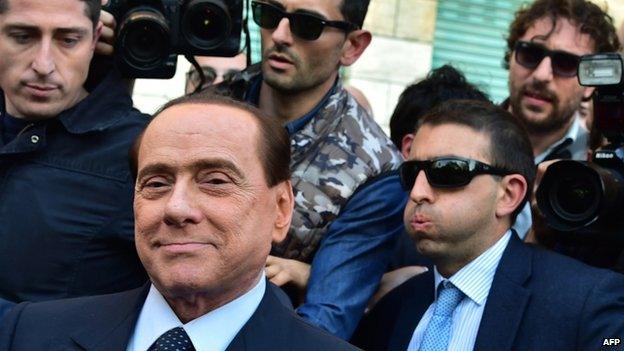
Italy's former Prime Minister Silvio Berlusconi has started a year of community service at a care home near Milan following a tax fraud conviction.
But this is not the only court case the 77-year-old has been embroiled in.
Berlusconi, a billionaire businessman, is still fighting several other criminal convictions arising from trials held since he left office in November 2011.
He has rejected all charges and is awaiting decisions on his appeals.

Why was he convicted of fraud?
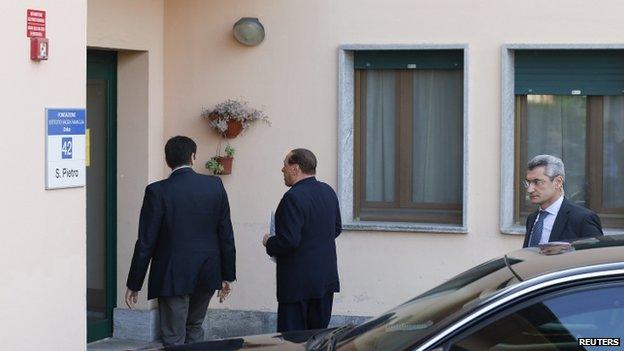
Silvio Berlusconi is seen entering the San Pietro care home on his first day of community service
Berlusconi was found guilty in October 2012 of tax fraud in connection with the purchase of TV rights by his firm, Mediaset, in the 1990s.
The court heard that he and other executives had bought TV rights at inflated prices via two offshore companies, to avoid paying taxes in Italy.
Berlusconi was sentenced to four years in prison last year, automatically reduced to one under a 2006 pardon act.
He is doing community service instead of prison because the Italian legal system is lenient to the over-70s.
He was also banned from holding public office for five years. That ban is now under review.

Which trial made the most headlines?
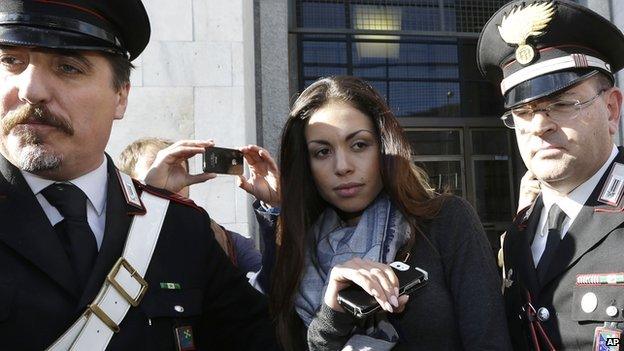
Karima El-Mahroug was at the centre of the "Rubygate" trial
In June 2013, Berlusconi was convicted of paying for sex with an under-age prostitute and abusing his power. He was sentenced to seven years in jail and banned from ever again holding public office.
However, he was allowed to remain free pending the outcome of the appeals process.
Journalists dubbed the trial "Rubygate" after the nickname of the Moroccan dancer at the centre of the trial, Karima El-Mahroug, also known as Ruby Rubacuori (Ruby The Heartstealer).
Judges found Berlusconi guilty of paying for sex with Ms Mahroug in 2010, when she was 17. The court heard that he had slept with her on 13 occasions at a time when he was still Italy's prime minister.
He was also found to have abused the powers of his office by arranging to have her released from police custody when she was detained in a petty theft case.
Both she and the former prime minister denied having sex, and Ms Mahroug denied having ever been a prostitute.
In January 2014, Milan judicial authorities announced that Berlusconi, two senior lawyers and Ms Mahroug would be among more than 40 people investigated on new allegations of witness tampering in the case.

And the wiretap conviction?
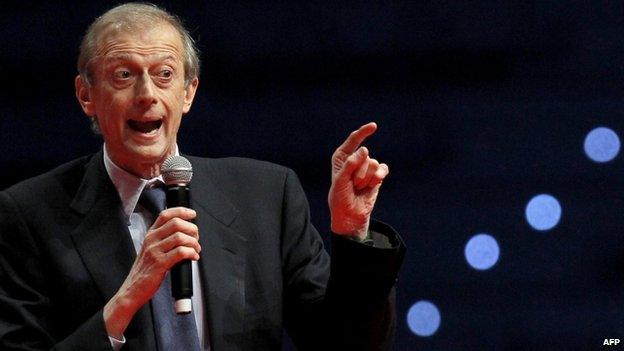
The scandal involved Turin mayor Piero Fassino who was Berlusconi's biggest political rival at the time
Berlusconi was convicted of breaching confidentiality in March 2013 and sentenced to one year in jail.
He was found to have arranged for a police wiretap concerning a political rival to be leaked and published in a newspaper.
Prosecutors brought the case after a transcript of a phone conversation intercepted by the authorities was published in the newspaper Il Giornale, owned by Mr Berlusconi's brother Paolo.
The conversation took place between the head of insurer Unipol and Piero Fassino, who was the leader of the biggest centre-left party and Berlusconi's biggest political rival at the time.
Unipol was trying to take over BNL bank in 2005. Magistrates had ordered the wiretap as they suspected inappropriate interference in the takeover.
Berlusconi remains free pending an appeal, as does Paolo, 64, who was convicted of the same charge and jailed for two years and three months.

Does he face any other cases?
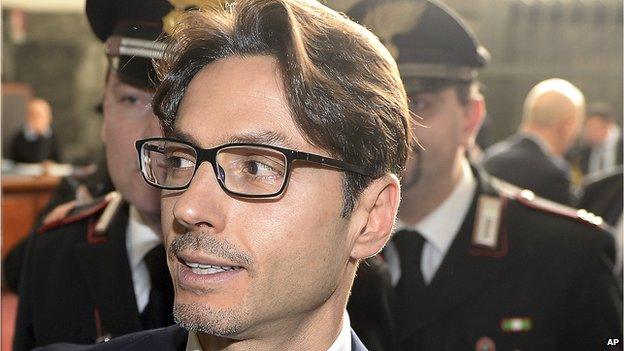
One of the defendants in the Mediatrade trial, dropped in 2012, was Berlusconi's son, Pier Silvio
In February 2014, a new trial opened against Berlusconi in Naples, in which he is accused of paying a bribe of 3m euros (£2.5m; $4m) to a senator in 2006 to switch to his party, thereby undermining the government of the time.
Two other corruption cases involving tax evasion and the bribing of a British lawyer expired under the statute of limitations.
The first case, Mediatrade, also concerned alleged fraud over inflated prices for TV rights. One of the defendants was Mr Berlusconi's son, Pier Silvio Berlusconi, Mediaset's deputy chairman. The case was dropped in 2012.
In February 2012, a case involving British tax lawyer David Mills was dropped. Berlusconi was alleged to have paid him 434,000 euros to lie under oath in two corruption trials in the 1990s.
All the defendants rejected the accusations.

What does Berlusconi say in his defence?
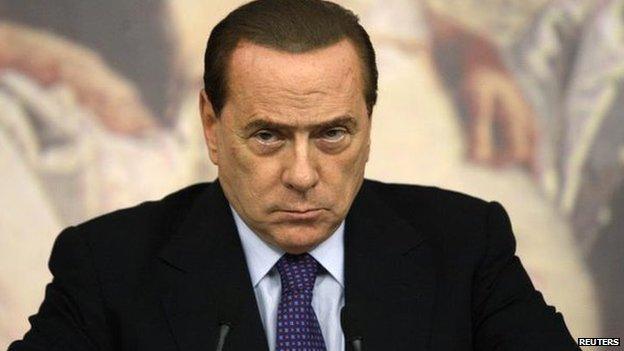
Berlusconi says he is the victim of a left-wing witchhunt
He says he is being targeted by left-wing Milan prosecutors pursuing a vendetta against him.
He has complained of being "the most persecuted man in the entire history of the world".
After the original Mediaset sentence, he condemned the decision as a "political verdict" and complained of "judicial harassment".

Why did the trials all come up at once?
In January 2011, Italy's Constitutional Court swept away part of a law passed in 2010 granting 18 months of immunity to Berlusconi and some of his senior ministers.
The ruling meant that it would be up to individual trial judges to decide whether he should be allowed to argue that his job was a "legitimate impediment" to a court case.
A legitimate impediment could include a state visit, an EU summit or perhaps a cabinet meeting while he was still prime minister.

How can he afford to fight so many cases?
Berlusconi is not short of money: Forbes magazine reckons his fortune to be about $9bn. However, he estimated back in 2009 that he had spent more than $200m in legal fees over two decades, with more than 2,500 court appearances in 106 trials.